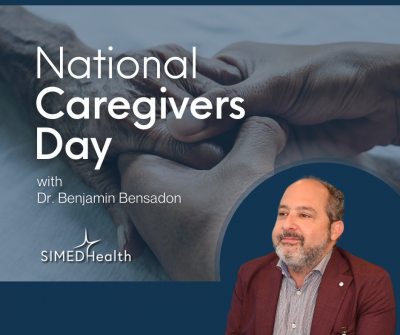
February 17th is National Caregivers Day!
SIMEDHealth Psychologist, Dr. Bensadon discusses the physical and emotional toll it takes to be a caregiver.
What defines a caregiver?
A caregiver is someone who provides direct care to someone else. Types of care vary and often depend on the health status, condition, and needs of the care recipient. The United States health care system is generally an acute and sub-acute model even though our aging society has led to significant increases in chronic, incurable conditions. As a result, many Americans must self-manage their chronic conditions and this generally requires efforts from both patients and informal, non-professional/unpaid caregivers, who are often family members. According to the Centers for Disease Control and Prevention (CDC):
- 58% of caregivers are women.
- Almost one-third of caregivers provide care at least 20 hours a week.
- Caregivers typically learn as they go and aren’t formally trained.
- 79% of caregivers care for adults aged 50 or older, and 76% of care recipients are aged 65 years and older.2
- One in 6 non-caregivers expects to become a caregiver within two years.
What are the challenges a caregiver faces?
Caregivers often face the same challenges as those for whom they provide care. Caregiver burden is a well-established concept that encapsulates these challenges. It can be broken down into objective and subjective burden. Objective burden is a measure of the amount of duties and tasks required in the caregiving role, while subjective burden is the degree to which the caregiver feels and perceives their role as burdensome. In truth, people vary in what they consider burdensome. What one person perceives as a burden another may perceive as a privilege.
Why is self-care important for a caregiver?
Caregiving can be rewarding but can also be draining. Caregivers often perform duties which are not acknowledged by others. This lack of recognition can result in caregivers feeling they are in a thankless position. Perceived lack of appreciation for one’s efforts can accelerate frustration, deplete energy, and lead to emotional exhaustion, a core component of burnout. No one is immune to burnout. This applies to professional caregivers (e.g., doctors, nurses) and non-professional caregivers (family, friends) alike. Self-care can help caregivers preserve themselves and buffer burnout. Ultimately this can help caregivers remain in the caregiver role longer, and with fewer negative consequences. Care recipients and caregivers each have needs. Balance is vital. Without it, it is not uncommon for caregiver health to deteriorate more rapidly than the health of their care recipients.
How can a caregiver support their mental health?
Fortunately, many of the challenging psychosocial realities of caregiving are amenable to psychological intervention. Caregivers need and can benefit from support just like anyone else. A key challenge, however, is caregivers often focus more on care recipients’ needs than their own, and as a result may have difficulty prioritizing or even acknowledging their own needs. Caregivers often feel they cannot afford (emotionally, financially) to take the time to focus on themselves, and if they do, they often feel guilty about doing so.
What are some resources available for caregivers?
The National Alliance for Caregiving https://www.caregiving.org/
Caregiver Action Network https://www.caregiveraction.org/
Family Caregiver Alliance https://www.caregiveraction.org/
National Alliance on Mental Illness https://www.nami.org/Home
To schedule an appointment with Dr. Bensadon, click here.